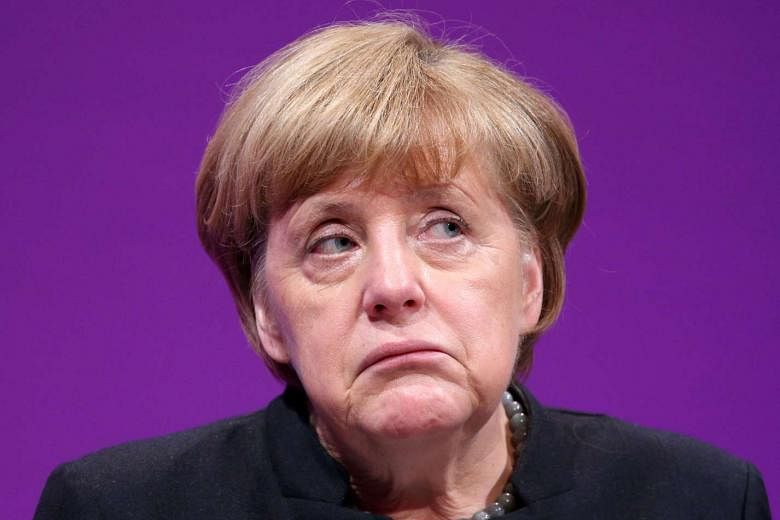LONDON (REUTERS) - Donald Trump's top trade adviser accused Germany on Tuesday (Jan 31) of using a "grossly undervalued" euro to gain a competitive advantage, drawing a rebuff from German Chancellor Angela Merkel and sending the euro to an eight-week high against the dollar.
Peter Navarro, the head of the US President's new National Trade Council, told the Financial Times the euro was like an"implicit Deutsche Mark" whose low valuation gave Germany an edge over the United States and its European Union partners.
Navarro's comments are the latest from Washington that may deepen growing unease over the outlook for global trade, after Trump himself told the Wall Street Journal two weeks ago that the dollar's strength against the Chinese yuan "is killing us".
The euro rose sharply to an eight-week high against the dollar of US$1.08, further away from the 14-year low of US$1.0339 it hit earlier this month. It had fallen almost 25 per cent over the previous three years.
"Germany is a country that has always called for the European Central Bank to pursue an independent policy, just as the Bundesbank did before the euro existed," Merkel told a news conference in Stockholm with Swedish Prime Minister Stefan Lofven.
Those who argue the euro is undervalued often blame the ECB's ultra-easy monetary policy, including trillions of euros of asset purchases, aimed at stimulating inflation and growth in the euro zone.
The US Federal Reserve, meanwhile, has begun raising interest rates from financial crisis-era lows.
"Because of that, we will not influence the behaviour of the ECB. And as a result, I cannot and do not want to change the situation as it is," Merkel added.
A German finance ministry spokeswoman said it was unfair to single out Germany's current account surplus since it was only one country of 19 in the currency union, adding: "After all, no one argues about the current account status of California."
She noted that rising oil prices would mitigate the positive impact of lower currency rates, which meant the German surplus was projected to narrow this year.
Figures released on Tuesday showed the euro zone economy grew at an annualised rate of 2 per cent in the fourth quarter, outstripping the US economy's 1.9 per cent.
Trump's proposed tax cuts, fiscal spending plans and rising US interest rates had boosted the dollar globally.
But a strong currency threatens US competitiveness and would make bringing manufacturing jobs back to the United States - a key Trump election pledge - more difficult.
"We sense the strong dollar policy is over, a thing of the past," said Neil Jones, head of hedge fund FX sales at Mizuho in London.
"Recent US concern over the strong dollar versus China is now feeding into the euro zone with these comments on an undervalued euro."
Navarro, a leading China critic and author of a book called Death By China, said Germany was one of the main hurdles to a US-EU trade deal and that talks on the Transatlantic Trade and Investment Partnership (TTIP) were dead, the FT reported.
"A big obstacle to viewing TTIP as a bilateral deal is Germany, which continues to exploit other countries in the EU as well as the US with an 'implicit Deutsche Mark' that is grossly undervalued," the newspaper quoted Navarro as saying.
"The German structural imbalance in trade with the rest of the EU and the US underscores the economic heterogeneity within the EU - ergo, this (TTIP) is a multilateral deal in bilateral dress."
Successive US Treasury Secretaries since Robert Rubin in the Clinton administration have repeated his mantra, first enunciated in 1995, that a strong dollar is in the interests of the United States.
Treasury Secretary nominee Steven Mnuchin tried to maintain that tricky balance at his confirmation hearing before the Senate Finance Committee earlier this month. He said Trump's remarks referred to a short-term spike in the dollar due to market factors, not its longer-term value.
"The long-term strength over long periods of time is important" for the dollar, Mnuchin said.

